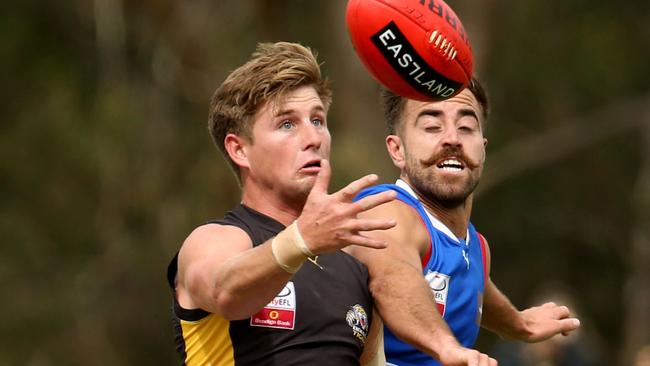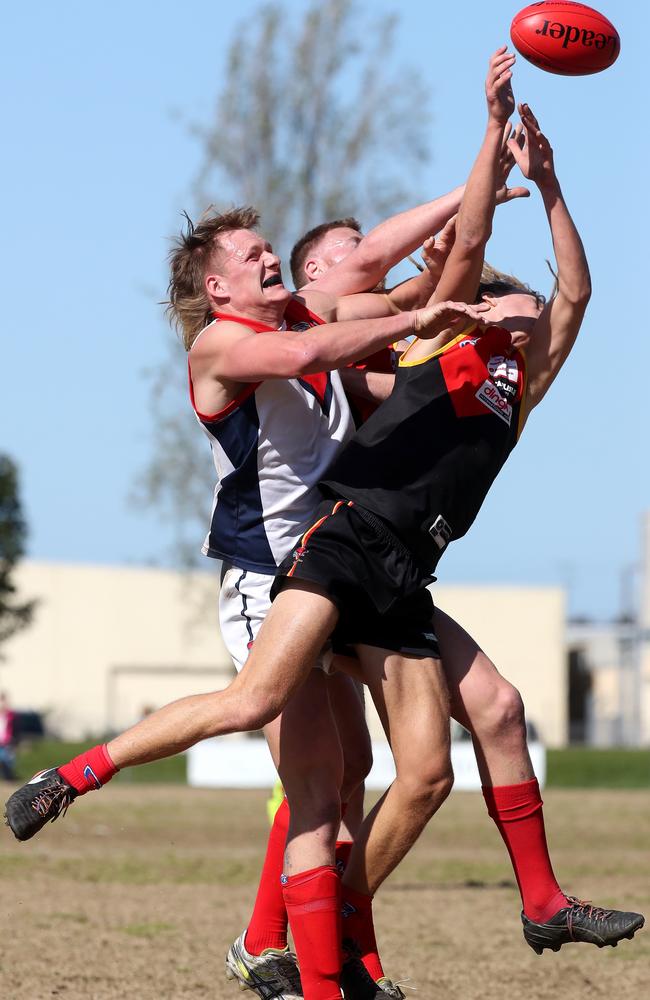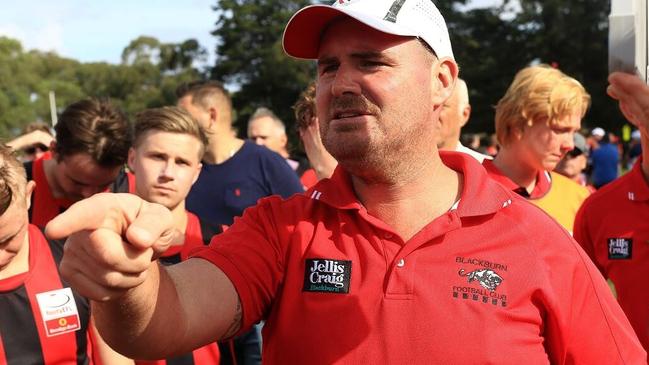Talent drain: metro players, coaches frustrated at country leagues’ free kick
Metro footballers and coaches have lashed out at top division salary cap restrictions, as star players set off to country comps.

Eastern
Don't miss out on the headlines from Eastern. Followed categories will be added to My News.
Star Balwyn forward Charlie Haley says metropolitan football is suffering a player drain to country ranks because of a lower salary cap.
AFL Victoria’s “community club sustainability program’’ (CCSP) committee yesterday ratified the player-payment ceilings for all Victorian leagues for 2022.
And while the metro competitions will remain at $100,000, major country leagues can spend more.
The Goulburn Valley, for example, will be at $125,000 and the Gippsland league at $120,000.
As Haley sees it, the $20,000 difference between metro and country represents a top-line player.
He said the Eastern league would start to drop in standard if it continued to lose champions like Tom Schneider, who has left Vermont to join Gippsland league club Traralgon.
His 2019 Vermont premiership teammates Jake Best and Brett Eddy are also at Traralgon, Best as coach.
The Gippsland league has had an eye-grabbing influx of players in the past few weeks, with Warragul signing former Carlton pair Nick Graham (from Spotswood) and Jed Lamb (White Hills) and ruckman Mitch Smart from Bentleigh, Eddy and Schneider reuniting with Best at Traralgon, Bairnsdale securing former Port Adelaide and St Kilda defender Logan Austin as senior coach, and Sale regaining former Gold Coast Sun Jack Leslie from Williamstown.
The salary caps for metropolitan leagues were set at $100,000 for 2021, 2022 and 2023 to ease Covid-related financial pressures on clubs. But they are reviewed annually and the ceiling for 2023 may be increased.

Eastern had been at $200,000 for the 2020 season that never went ahead, and even higher in previous seasons. Southern was at $150,000.
“We’re losing good players over it, and that’s disappointing,’’ Haley, who on social media called the situation a “disgrace’’, said.
“The country clubs are willing to pay big money because their lesser players are on pretty much nothing.
“The Eastern league has lost so many good players in the last three years, I reckon, just pretty much due to that. And it’s so hard to recruit now. We’re trying to recruit good players but they end up going and playing in the bush.’’
Haley said he understood the need to ease pressure on clubs during Covid but the $100,000 salary cap was too low, players would go elsewhere and the standard of football would drop.
He said a good player could command $25,000 to $30,000 a year from a country club, whereas he would get no more than $10,000 from a metro club.
“It’s very hard to get good players and very hard to retain good players,’’ Haley said.
“It was $200,000. We need to get it back up. Otherwise you’re more or less giving away a free player.’’
Blackburn senior coach Brendan Allen said he was “frustrated’’ and “despondent’’.
“We’re in a fortunate position at Blackburn that we could pay what it originally was – $225,000 – without batting an eyelid. We don’t have pokies revenue, we don’t have any other form (of revenue), bar the traditional ways – bar, gates, coterie groups and all that sort of stuff,’’ he said.

“We don’t go outside the rules and that’s (salary cap cuts) probably where we’ve lost our competitive advantage, because the cap’s dropped, and we drop with the cap.
“The Eastern footy league needs to have a bit of a look at themselves and say, ‘Do we want to be the premier comp outside of the VFL?’ because at the moment, they’re losing that much talent that they won’t be.
“I’m absolutely becoming really, increasingly frustrated and despondent – we’re offering if not better facilities and better programs than these country clubs, but we just can’t match them dollar for dollar, or (offer) lucrative over the top jobs.
“It’s a pretty hard landscape. To get (recruits) out of anywhere, you have to pay them overs a little bit, to get people to move. We want to reward the people in our club at the moment. It doesn’t leave much out of 100 grand to get people in.
“It just makes it tough.’’
One metropolitan league official said he was comfortable with having the salary cap at $100,000, as long as surrounding country leagues were at the same mark.
He said the Western Region, for example, would be vulnerable if the Geelong league had a bigger salary.
The Ovens and Murray league set a figure of $120,000 this year.
Its general manager, Craig Millar, said the tighter cap and lower points system had made local football better.
“I think what we’re seeing is more metropolitan guys are wanting to give country footy a go,” he said.
“There’s been a sprinkling come out of Melbourne so far and we’re excited to see what they can add to our competition.
“We’ve been talking to metro comps and AFL North-East about our salary cap and points system because we want to make sure it is sustainable.”
At $125,000, the Goulburn Valley league will have one of the highest caps in country football next season.
Seymour coach Ben Davey said the bigger cap didn’t necessarily mean access to better players.
“I think how your club is going will attract players,” he said.
“If you have the right culture and there is a chance of success people are going to want to play for you.
“We’ve been fortunate to re-sign our entire list from last year and add to what we’ve got.
“But that’s been helped by how we performed this year, not the greater money on offer.”
The CCSP committee – which has representatives from metropolitan and country football – also ticked off the player-points cap yesterday.
Forty-six, down from 47, is the state maximum.
An AFL Victoria spokesman said player payments would mostly remain the same from 2021 to 2022.
He said it was a “good outcome for community football across the board, particularly given the uncertainty and disruption caused by the pandemic in the past two seasons’’.
“This gives leagues and clubs clarity heading into the 2022 season,’’ the spokesman said.
“There are a small number of leagues where minor changes to player payments will occur, for reasons including changes to number of matches and players on the field. But there are no substantial changes to allowable player payments across country and metro leagues.’’




